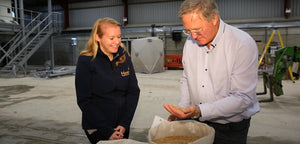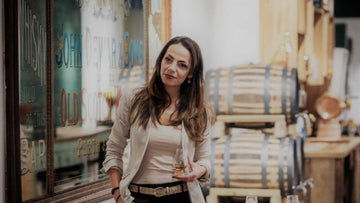Whisky Jobs… Pete Robson on being a Maltster
Pete Robson is a qualified Master Maltster with 30+ years of experience in the UK malting industry in senior production and sales roles. We asked him to tell us more about the day-to-day and what qualities are required to succeed in the role…
A Maltster takes barley from the farmers and turns it into malt by germinating it so that it can be used as the raw material to produce alcohol in the brewing and distilling industries. Malting is the controlled rehydration and germination of cereals, followed by a termination of this natural process by the application of heat. These processes are known as Steeping, Germinating & Kilning. The heat that is applied to 'kiln' the grain produces the colour and flavour required by the brewer or distiller.
In simplistic terms, the maltster copies what happens when the farmer sows the cereal seeds in the ground during the first two stages of the malting process: the grain takes up water and starts to germinate. If this germination were allowed to continue, the resulting plant growth would consume all the starches and sugars that the brewer or distiller needs for fermentation. The skill of the maltster, therefore, is to monitor this germination closely and know exactly when to stop the process.
Many cereals have been used for malting but barley can be considered the most important, both traditionally and technically. In its malted form, barley provides the carbohydrate, protein and vitamins needed for yeast growth during the alcohol production process.
One of the joys of being a maltster is that each day different and new challenges are always just around the corner. The demands of the customer change regularly so the product a maltster produces must be adjusted to match these demands. Also, the barley growing conditions change every year – some years are dry and hot, others are cold and wet or somewhere in between. These weather patterns determine how the barley will grow so each season produces a different range of barley qualities which will impact how the barley grows in the maltings.
Most days therefore start with an inspection of the product currently in process. The malting process typically takes around seven days to complete one batch: two days steeping, four days germination and one day kilning. A commercial maltings will have as many as seven batches in process at any one time, all at different stages.
The inspection of the process will happen at least three times per day and the information gathered from these physical and sensory checks is used to determine the conditions required during the next stages in order to meet the customers specification. The key parameters the maltster uses to control the growth are the temperature and the water content of the grain as it proceeds through the malting phases.
The rest of the day is taken up with planning the production process to ensure the correct barley is processed to meet the demand from the brewing and distilling customers. This plan is started by looking at current malt stocks along with the forecast deliveries and then working backwards to get the correct raw material into the process to meet future demand. This is a complex exercise as it can take several weeks for the malt to be ready for despatch and it can be a juggling act to ensure all the correct grades of malt are available at the correct time, so the attention is in the detail. The difference between something good and something great is in the attention to detail.
Part of the planning process is to review the quality of the material analysed in the lab. Each batch will have a comprehensive set of analyses carried out to ensure it meets the customers specification and the relevant food safety regulations in the destination country. Some of this analysis can take several days to be completed so there are results from several different batches being looked at each day.
All of this has to be logged somewhere (either on a paper trail and/or a computerised system) and this has to be done in real time to make the system work efficiently. All maltsters now operate to some form of quality assurance scheme, so this has to be maintained at a high level. The “glue” that keeps all this together is communication. Regular meetings with all the other disciplines/departments are held to ensure everything happens when it should.
A maltster needs to be a bit of an allrounder as many skills are involved in the industry. From agronomics for the barley procurement, to biology for the steeping, germination and kilning processes. There’s engineering knowledge to manage the process equipment, computer skills to manage the data and probably the most important of all is people management skills as without these it will be very difficult to pull a team together.
The introduction of modern hi-tech systems and equipment has been the major change over the last 40 years. This has allowed quality assurance schemes to be effectively implemented across the whole supply chain from barley breeding through the malting process and on to haulage monitoring and tracking. Modern hygienic construction materials have helped produce high quality malt with stainless steel now the norm in the malting process rather than concrete and mild steel. Sustainability is now a key driver to many maltsters with each are being scrutinised for its impact on the environment. The one aspect that hasn’t changed is the “Maltsters Art” – not everything can be controlled by numbers and the maltsters still needs to use their senses of smell, sight and hearing to understand the process.
I have always found the malting industry with its links to the food and drinks sector a fun place to work and this is a key factor in my mind to any form of job satisfaction. I had an engineering background which helped cover the technical aspects of the role. I would strongly recommend it to anyone as it offers a wide range of roles from general management to specialists and as such needs people from a cross section of disciplines and skills.
It is a global industry with many opportunities. I also believe that it is an industry where you never stop learning something new.







